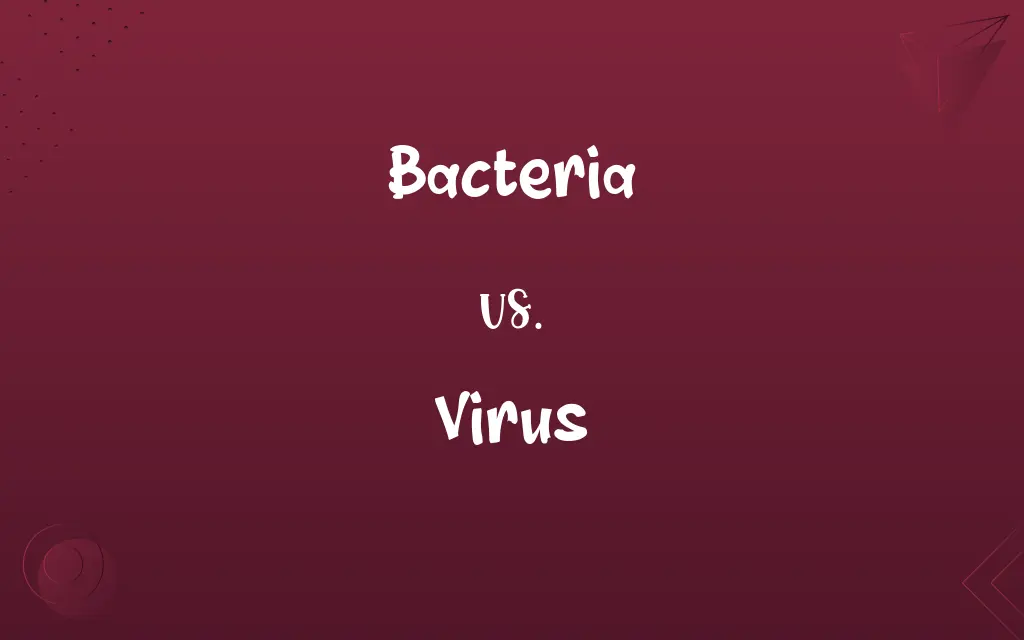Bacteria vs. Virus: Know the Difference

By Shumaila Saeed || Updated on December 25, 2023
Bacteria are single-celled, living organisms often beneficial to health, while viruses are non-living infectious agents requiring a host to replicate.

Key Differences
Bacteria are microscopic, single-celled organisms that exist in various environments, beneficial or harmful to humans. Viruses are much smaller than bacteria and cannot survive without a host, as they need to hijack a host cell to reproduce.
Shumaila Saeed
Nov 18, 2023
Unlike bacteria, which can independently carry out metabolic processes, viruses are non-living and consist of genetic material (DNA or RNA) enclosed in a protein coat. They invade living cells and use their machinery to multiply.
Shumaila Saeed
Nov 18, 2023
Bacteria can reproduce on their own and can be treated with antibiotics in case of infection. However, viruses require specific antiviral medications, as antibiotics are ineffective against them, given their lack of metabolic pathways.
Shumaila Saeed
Nov 18, 2023
Many types of bacteria are beneficial, playing essential roles in processes like digestion and nutrient cycling. In contrast, viruses are generally known for causing diseases, from the common cold to more severe illnesses.
Shumaila Saeed
Nov 18, 2023
In the biological classification, bacteria belong to the prokaryote domain, having a simpler cell structure without a nucleus. Viruses, however, are not considered part of any kingdom of life due to their non-living status and parasitic replication method.
Shumaila Saeed
Nov 18, 2023
ADVERTISEMENT
Comparison Chart
Size
Larger, can be seen under a microscope
Smaller than bacteria, require electron microscope
Shumaila Saeed
Nov 18, 2023
ADVERTISEMENT
Bacteria and Virus Definitions
Bacteria
Prokaryotic organisms that can be either beneficial or harmful.
Harmful bacteria can cause food poisoning.
Shumaila Saeed
Nov 17, 2023
Virus
A microscopic infectious agent that replicates only inside the living cells of organisms.
The flu is caused by a virus.
Shumaila Saeed
Nov 17, 2023
Bacteria
Microscopic single-celled organisms that can be found in diverse environments.
Yogurt contains beneficial bacteria that aid digestion.
Shumaila Saeed
Nov 17, 2023
Virus
Agents responsible for a range of diseases, from common colds to severe conditions.
HIV is a virus that attacks the immune system.
Shumaila Saeed
Nov 17, 2023
Bacteria
Microorganisms that can exist as independent living entities.
Bacteria in our gut microbiome are vital for our health.
Shumaila Saeed
Nov 17, 2023
ADVERTISEMENT
Virus
Extremely small infectious agents that require a host for replication.
Vaccines are developed to protect against viral infections.
Shumaila Saeed
Nov 17, 2023
Bacteria
Tiny organisms, some of which cause diseases, while others are beneficial.
Antibiotics are used to treat bacterial infections.
Shumaila Saeed
Nov 17, 2023
Virus
Non-living entities that invade cells and hijack their machinery to reproduce.
A virus can remain dormant until it enters a suitable host.
Shumaila Saeed
Nov 17, 2023
Bacteria
Small organisms often associated with infections but also essential for ecological balance.
Soil bacteria play a crucial role in nutrient recycling.
Shumaila Saeed
Nov 17, 2023
Virus
Any of various submicroscopic agents that infect living organisms, often causing disease, and that consist of a single or double strand of RNA or DNA surrounded by a protein coat. Unable to replicate without a host cell, viruses are typically not considered living organisms.
Shumaila Saeed
Oct 19, 2023
Virus
A computer program or series of commands that can replicate itself and that spreads by inserting copies of itself into other files or programs which users later transfer to other computers. Viruses usually have a harmful effect, as in erasing all the data on a disk.
Shumaila Saeed
Oct 19, 2023
Virus
A submicroscopic, non-cellular structure consisting of a core of DNA or RNA surrounded by a protein coat, that requires a living host cell to replicate, and often causes disease in the host organism; such agents are often classed as nonliving infectious particles and less often as microorganisms.
Shumaila Saeed
Oct 19, 2023
Bacteria
An oval bacterium, as distinguished from a spherical coccus or rod-shaped bacillus.
Shumaila Saeed
Oct 19, 2023
Virus
A disease caused by such an infectious agent; a viral illness.
He's got a virus and had to stay home from school.
Shumaila Saeed
Oct 19, 2023
Bacteria
(microbiology) single-celled or noncellular spherical or spiral or rod-shaped organisms lacking chlorophyll that reproduce by fission; important as pathogens and for biochemical properties; taxonomy is difficult; often considered plants
Shumaila Saeed
Oct 19, 2023
Virus
(computing) A type of malware which can covertly transmit itself between computers via networks (especially the Internet) or removable storage such as disks, often causing damage to systems and data; also computer virus.
Shumaila Saeed
Oct 19, 2023
Virus
(figurative) Any malicious or dangerous entity that spreads from one place or person to another.
Shumaila Saeed
Oct 19, 2023
Virus
To send or infect an electronic device with a computer virus.
I'm just going to virus anyone who tries cheating on this game.
Shumaila Saeed
Oct 19, 2023
Virus
Contagious or poisonous matter, as of specific ulcers, the bite of snakes, etc.; - applied to organic poisons.
Shumaila Saeed
Oct 19, 2023
Virus
Any of numerous submicroscopic complex organic objects which have genetic material and may be considered as living organisms but have no proper cell membrane, and thus cannot by themselves perform metabolic processes, requiring entry into a host cell in order to multiply. The simplest viruses have no lipid envelope and may be considered as complex aggregates of molecules, sometimes only a nucleic acid (DNA or RNA) and a coat protein. They are sometimes viewed as being on the borderline between living and nonliving objects. They are smaller than living cells in size, usually between 20 and 300 nm; thus they pass through standard filters, and were previously referred to as filterable virus. The manifestations of disease caused by multiplication of viruses in cells may be due to destruction of the cells caused by subversion of the cellular metabolic processes by the virus, or by synthesis of a virus-specific toxin. Viruses may infect animals, plants, or microorganisms; those infecting bacteria are also called bacteriophages. Certain bacteriophages may be non-destructive and benign in the host; - see bacteriophage.
Shumaila Saeed
Oct 19, 2023
Virus
Fig.: Any morbid corrupting quality in intellectual or moral conditions; something that poisons the mind or the soul; as, the virus of obscene books.
Shumaila Saeed
Oct 19, 2023
Virus
A program or segment of program code that may make copies of itself (replicate), attach itself to other programs, and perform unwanted actions within a computer; also called computer virus or virus program. Such programs are almost always introduced into a computer without the knowledge or assent of its owner, and are often malicious, causing destructive actions such as erasing data on disk, but sometime only annoying, causing peculiar objects to appear on the display. The form of sociopathic mental disease that causes a programmer to write such a program has not yet been given a name. Compare trojan horse{3}.
Shumaila Saeed
Oct 19, 2023
Virus
(virology) ultramicroscopic infectious agent that replicates itself only within cells of living hosts; many are pathogenic; a piece of nucleic acid (DNA or RNA) wrapped in a thin coat of protein
Shumaila Saeed
Oct 19, 2023
Virus
A harmful or corrupting agency;
Bigotry is a virus that must not be allowed to spread
The virus of jealousy is latent in everyone
Shumaila Saeed
Oct 19, 2023
Virus
A software program capable of reproducing itself and usually capable of causing great harm to files or other programs on the same computer;
A true virus cannot spread to another computer without human assistance
Shumaila Saeed
Oct 19, 2023
Virus
Infectious particles comprising genetic material wrapped in a protein coat.
The COVID-19 pandemic was caused by a novel coronavirus, a type of virus.
Shumaila Saeed
Nov 17, 2023
Repeatedly Asked Queries
Can viruses reproduce on their own?
No, viruses cannot reproduce on their own; they need a host cell to replicate.
Shumaila Saeed
Nov 18, 2023
What is a virus?
A virus is a microscopic infectious agent that replicates inside the cells of living hosts.
Shumaila Saeed
Nov 18, 2023
What are bacteria?
Bacteria are single-celled microorganisms, some of which are beneficial, while others can cause diseases.
Shumaila Saeed
Nov 18, 2023
How do bacteria reproduce?
Bacteria reproduce independently through a process called binary fission.
Shumaila Saeed
Nov 18, 2023
What are some common diseases caused by bacteria?
Tuberculosis, strep throat, and urinary tract infections are common bacterial diseases.
Shumaila Saeed
Nov 18, 2023
Are all bacteria harmful?
No, many bacteria are beneficial and essential for various ecological processes and human health.
Shumaila Saeed
Nov 18, 2023
Are antibiotics effective against viruses?
No, antibiotics are ineffective against viruses.
Shumaila Saeed
Nov 18, 2023
Do viruses play any beneficial role?
Viruses mainly cause diseases, but some can be used in gene therapy and biotechnology.
Shumaila Saeed
Nov 18, 2023
What are some common viral diseases?
The flu, common cold, and COVID-19 are examples of viral diseases.
Shumaila Saeed
Nov 18, 2023
Can bacteria be seen with the naked eye?
No, bacteria are too small to be seen without a microscope.
Shumaila Saeed
Nov 18, 2023
How are viruses different in size compared to bacteria?
Viruses are much smaller than bacteria and usually require an electron microscope to be seen.
Shumaila Saeed
Nov 18, 2023
What are antivirals?
Antivirals are medications used to treat viral infections.
Shumaila Saeed
Nov 18, 2023
How can bacterial infections be treated?
Bacterial infections are usually treated with antibiotics.
Shumaila Saeed
Nov 18, 2023
Do viruses live outside of host cells?
Viruses can survive outside of host cells but cannot replicate without a host.
Shumaila Saeed
Nov 18, 2023
What composes a virus?
A virus is composed of genetic material (DNA or RNA) enclosed in a protein coat.
Shumaila Saeed
Nov 18, 2023
What is the structure of a bacterial cell?
Bacterial cells are prokaryotic, lacking a true nucleus and organelles.
Shumaila Saeed
Nov 18, 2023
Are bacteria considered living organisms?
Yes, bacteria are considered living organisms as they can carry out life processes independently.
Shumaila Saeed
Nov 18, 2023
Can bacteria live independently?
Yes, bacteria can live independently, as they are single-celled organisms.
Shumaila Saeed
Nov 18, 2023
How do bacteria contribute to the environment?
Bacteria contribute to nutrient cycling, decomposition, and other ecological processes.
Shumaila Saeed
Nov 18, 2023
Can viral diseases be prevented?
Many viral diseases can be prevented with vaccines and hygiene practices.
Shumaila Saeed
Nov 18, 2023
Share this page
Link for your blog / website
HTML
Link to share via messenger
About Author
Written by
Shumaila SaeedShumaila Saeed, an expert content creator with 6 years of experience, specializes in distilling complex topics into easily digestible comparisons, shining a light on the nuances that both inform and educate readers with clarity and accuracy.






































































